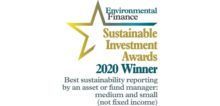Triodos Investment Management is winner of the Environmental Finance Sustainability Awards 2020 in the category ‘Best sustainability reporting by an asset or fund manager: medium and small (not fixed income)’.
Triodos Investment Management (IM) describes itself as a pure-play impact investment firm. This means all €4.9 billion of its assets are deployed with the goal of achieving impact, explains Andrea Palmer, product specialist for impact equities and bonds.
And this is not new. The Dutch company’s aim has always been “to use capital as a force for environmental and social change,” she says.
The judges agreed with Triodos’ claim that its 2019 impact report illustrates best practice in terms of environmental, social, and governance (ESG) reporting. It covers the full Triodos IM portfolio and includes ESG data at various levels, including asset class, impact theme and fund level.
Separate impact reports are produced for each of the firm’s main investment themes:
- Impact equities and bonds (public investments);
- Financial inclusion (private investments);
- Energy and climate (private investments); and
- Sustainable food and agriculture (private investments).
The company reports the ‘net impact’ of its portfolios and key metrics are clearly displayed. For its listed equity and debt funds, the report includes a breakdown of portfolio company revenue that addresses the UN Sustainable Development Goals (both positively or negatively) against the benchmark. For private investments, the company reports for instance on important environmental and social indicators as aligned with the Global Impact Investing Network (GIIN)’s IRIS+ core indicator set and the Partnership for Carbon Accounting Financials (PCAF).
The reports are contextualised with stories and videos and integrate other major impact reporting frameworks including the Sustainable Development Goals and GHG Protocol.
It is important that the reporting is consistent from year to year, Palmer notes, but some key innovations were introduced in the 2019 report.
They include:
- an examination of the physical and transition risks facing listed investments, in line with the recommendations of the Task Force on Climate-related Financial Disclosures (TCFD);
- an indication of how much of a portfolio has set ‘science-based targets’ for emissions reductions versus its benchmark; and
- case studies explaining why Company X is preferred over Company Y in a particular industry sector. In the food industry, for example, Triodos explains clearly why it invests in Danone but not Nestle.




